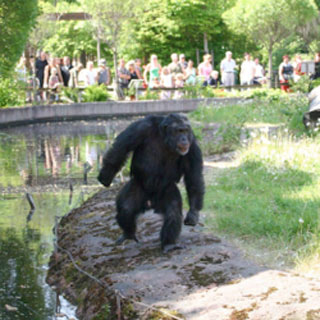Piloerectic Apes Have Plans
Posted by: Loren Coleman on March 10th, 2009

Santino carries a stone in his left hand. His forceful upright walking and piloerection (hair on end) indicate his agitation. Photo: Mathias Osvath, Current Biology
Current Biology Volume 19, Issue 5, 10 March 2009, Pages R190-R191
Summary of “Spontaneous planning for future stone throwing by a male chimpanzee” by Mathias Osvath
Planning for a future, rather than a current, mental state is a cognitive process generally viewed as uniquely human. Here, however, I shall report on a decade of observations of spontaneous planning by a male chimpanzee in a zoo. The planning actions, which took place in a calm state, included stone caching and the manufacture of discs from concrete, objects later used as missiles against zoo visitors during agitated chimpanzee dominance displays. Such planning implies advanced consciousness and cognition traditionally not associated with nonhuman animals. Spontaneous and unambiguous planning behaviours for future states by non-humans have not previously been reported, and anecdotal reports, describing single occasions, are exceptionally scarce. This dearth of observations is arguably the main reason for not ascribing cognitive foresight to nonhuman animals. To date, the surprisingly few controlled demonstrations of planning for future states by animals are experimentally induced behaviours in great apes and corvids. The observational findings in this report suggest that these laboratory results are not experimental artefacts, at least in the case of great apes.

Zoo workers assembled these stones to illustrate one of Santino’s typical arsenals. Photo: Mathias Osvath, Current Biology
For full details, see:
“Planning of the Apes: Zoo Chimp Plots Rock Attacks on Visitors” by Coco Ballantyne.
About Loren Coleman
Loren Coleman is one of the world’s leading cryptozoologists, some say “the” leading living cryptozoologist. Certainly, he is acknowledged as the current living American researcher and writer who has most popularized cryptozoology in the late 20th and early 21st centuries.
Starting his fieldwork and investigations in 1960, after traveling and trekking extensively in pursuit of cryptozoological mysteries, Coleman began writing to share his experiences in 1969. An honorary member of Ivan T. Sanderson’s Society for the Investigation of the Unexplained in the 1970s, Coleman has been bestowed with similar honorary memberships of the North Idaho College Cryptozoology Club in 1983, and in subsequent years, that of the British Columbia Scientific Cryptozoology Club, CryptoSafari International, and other international organizations. He was also a Life Member and Benefactor of the International Society of Cryptozoology (now-defunct).
Loren Coleman’s daily blog, as a member of the Cryptomundo Team, served as an ongoing avenue of communication for the ever-growing body of cryptozoo news from 2005 through 2013. He returned as an infrequent contributor beginning Halloween week of 2015.
Coleman is the founder in 2003, and current director of the International Cryptozoology Museum in Portland, Maine.










Prepare to bow to your monkey masters!
The ape got too smart, so they castrated him.
“For a while, zoo keepers tried locking Santino up in the morning so he couldn’t collect ammunition for his assaults, but he remained aggressive. They ultimately decided to castrate him in the autumn last year, but will have to wait until the summer to see if that helps.” Source.
How many here are surprised at this? *looking for raised hands* Yeah…me either.
How would this translate to bigger purported apes such as the Sasquatch and Yeti?
Also how would one compare these activities of planning to birds building nest for there upcoming eggs. Canines and felines searching for places to give birth at least a month in advance. Bird migration habits and so on.
What is the difference between hardwired instinct and actual creative and critical thinking?
Pets can very manipulative, and can also recognize when they are being manipulated. I have seen both sides strongly among House Cats.
Also Cats are very observative. My two cats can recognize my habits and discern accurately at a high rate as to whether it may mean they are going to get a treat or if I am preparing to clean there ears, or administer medicine, or let them outside.
And they also have a keen sense of the time of day and the time of week. Not to mention there legendary sense for location and direction.
Its hard to say how there consciousness works, but I would imagine that they (other animals) are brighter than we give them credit for being. 🙂
Spinach Village – I have one similar. I have 3 large dogs, inside dogs. They are pitbulls. One male (Ace, personality: alpha male, grumpy old man) and 2 young females: Bailey, personality: obsessive-compulsive disorder, hyper, ADD and then there’s Keira, personality: mishief and mayhem, but otherwise a sweety. Every 2 weeks when I get paid I buy them each a rawhide bone at Walmart which are now like $8 each, so $24 + tax, so they only get one every 2 weeks and they last maybe 3 days. So it’s a big treat for the dogs to get their bone. Ace is fine with his, the girls leave him be. But the girls are a different story, and this is where the premeditation comes in. The dogs are perceptive, they know by which pair of shoes I pick up if I’m going to take them out for a walk. So if the dogs have their rawhide bones and I get my old shoes, Bailey will pick up her bone, run to her kennel, walk inside the kennel and drop the bone and then walk back out, stand guard at the door, and will wait by her kennel, guarding it with her life, until I come close the door and latch it. She does that becuase if I take her outside and her bone is left in the floor, Keira will get it and go hide it somewhere while Bailey is outside. I don’t have to worry about Bailey messing with Keira’s bone because she is so obsessive about her own. Even with the bone locked safely in her kennel, she doesn’t seem confident it will be there when she gets back inside, lol. I take her out, and she does her business, then she drags me back to the front door, as soon as we get inside she dashes to her kennel and waits for me to open the door. And she’ll almost kill herself trying to get that bone back in her mouth. We go through this same routine each and every time, no exceptions.
This article brings to mind a program I saw a few years ago involving some kind of bird, perhaps a crow. The bird would place some kind of nut on the road, and then fly up on a wire and wait patiently. The actions of the bird were pre-meditated in the sense that it knew that this action would result in a car driving by and cracking the shell of the nut so that the bird could eat the contents. Birds also have plans.
I am surprised as to why people can’t imagine that animals can’t plan ahead.
I agree with Spinach Village & cliffhanger042002 that I’m having difficulty understanding the premise of this article.
Isn’t any predator —think large felids—that relies on stalking premeditating the right moment for its future course of action when it adopts a rigid stance, tensing its muscles so as to get ready to pounce on its prey?
And I also agree with Allan Slavik, birds are highly intelligent and capable of planning. There was this guy who invented a vending machine for crows (there was a pretty cool video about this at the TED website).
I suppose what we’re debating here is how further into the future are non-humans capable of planning.
Shame poor old santino loosing his credentials, no more horrorpilation for him I expect!
His masculinity loss will have a sad effect on group dynamics I shouldnt wonder. I know he might not have been the best male role model but the fact he had a bit of savvy on the other hand, ought to go in his favour.
A more civilised solution might have been found, involving better public screening and non availability of materials or maybe some kind of aversion therapy-say planted stones giving off a foul odour. Plus more for him to do.
Then the castration might not work and im biased.
Simple.
Humans are one of natures most retarded species (we are killing ourselves & the world we live in).
I don’t understand how they thought that animals couldn’t figure out how to plan ahead. Did they think EVERYTHING was instinct?
I am not surprised.
I also agree with you, Red Pill Junkie.
but would animals planning ahead for themselves, technically, make them sentient (I’m pretty sure that would mean that they are aware of themselves) beings?
That they realize that they can feed themselves, protect themselves, get attention, ect. and plan on how that they can get that ect. in the future?
I really have no idea. Someone correct me if I’m wrong.
Hi crapple,
Well, I think all would agree with me when I say that your question is one of the most difficult to answer to this day!
However, recent studies in Animal Behavior that have debunked many of our most esteemed beliefs about ourselves—e.g. that only men are capable of using tools and weapons, for example—would lead me to suspect that sentience and cognition are not terms that can only accept binary states—i.e. that a being is only either sentient or non-sentient— but that there are many different degrees of sentience, and that some creatures that share the planet with us are closer to our level of sentience than others.
And of course, that there might also be beings above our level of sentience somewhere else in the Universe 😉
The idea is that he’s in an easy-going emotional state, and that he’s calmly going about preparing for later when he will be in an enraged state.
It’s like buying yourself a stress toy in anticipation of the oncoming financial depression.
To me this suggests he’s not just being territorial, he really wants to nail one of those gawkers. Good for him! I think it’s a crime what they did to him…
We have this idea that what makes animals animals is they are in some sort of shifting cause and effect state, merely taking action as it occurs to them. But if a chimp can bridge these gaps through reflection, it could study its past behavior, resolve how to handle a situation in the future–before it actually happens.
We all know how a human would react to being imprisoned, lorded over and gawked at. As we learn more and more about chimps, when do we enter the gray area where we cannot prove the motivations of its behavior are not parallel to human? I think we already have.
So he is being ‘territorial.’ I would collect rocks to toss at my captors as well. Who is to say my innate rage at being captive doesn’t stem from a territorial instinct? Who is to say our hunger for ‘freedom’ isn’t just territorialism?
Bottom line: Primates do not belong in zoos.
To further clarify: What I’m saying is people are so touchy about anthropomorphizing, I think they could stand to do a little zoomorphizing (the opposite).
Considering the actions of humans I have witnessed in zoos, I don’t blame Santino one bit. Stupid people. REALLY stupid people that they just don’t get it, and insist on doing this to animals, then the zoo idiots thinking castrating him is going to make him LESS angry. Ugh!!
Knowing how well my dogs think and plan ahead, and knowing how the animals I have witnessed in nature have planned and acted, I am endlessly fascinated by how stupid people are…
Wow. Right off the bat, Osvath makes two major points, one direct, one oblique. Let’s parse.
1. (the direct one) “Planning for a future, rather than a current, mental state is a cognitive process generally viewed as uniquely human.”
This despite what I, personally, would consider tons of evidence to the contrary. Lions and wolves (and chimpanzees) setting up a team ambush are acting totally in the present moment? Pikas storing hay have no future concept? Really? But we view it that way, which takes us to
2. (the oblique one) “Here, however, I shall report on a decade of observations of spontaneous planning by a male chimpanzee in a zoo.”
ONE DECADE – TEN YEARS – OF OBSERVATIONS. For ‘today’s news.’
One of many points made against science in its study of the biosphere is that scientists simply don’t observe the entire range of animal behaviors. They just aren’t in the field near enough to do so. You know who is? Aboriginal hunters and gatherers, who have been telling us things about animals that we have pooh-poohed as quaint native beliefs for, well, centuries.
Until – one by one – they’re proven.
Nobody ever satisfactorily explained ‘instinct’ to me. And oh, they tried. I had to conclude that ‘instinct’ meant: we don’t know, we don’t want to bother to find out; so we’ll just posit something and be done with it. After all, who can gainsay us? We’re SCIENTISTS.
Suddenly their whole attitude about cryptids becomes much easier to comprehend, eh?
Spinach Village:
“How would this translate to bigger purported apes such as the Sasquatch and Yeti?”
Um, quite (although as we see, we don’t have to go to purported apes to find examples. Birds will do fine, as will practically any mammal one can think of).
Observations indicate the distinct possibility that sasquatch are not only very good solo hunters but very good team hunters as well. A report from OH leaves one with the strong impression that two sasquatch indicated to each other by wood knocks that they were in position; then one roared, flushing the animals in the direction of the other one. Several dead deer were found the next day in the immediate vicinity of the animal in whose apparent direction the deer ran when flushed. And yes, they’d been fed on – in a way totally atypical of any known animal but making big-time sense to an omnivore (with hands) making its way through a cold winter, which this was.
Yeti tracks are almost exclusively found at altitudes at which any biologist could make a good case yetis don’t live. One possibility? They’re caching food in snow for later use.
Oh. Never mind. Wolves and wolverines and bears and cougars and bobcats and coyotes do it too. 😉
What these scientists seem to imply is that our perception of time is somehow privileged, in the sense that we humans correctly interpret the unidirectional arrow of time—the past behind us, the future in front, and the present being the ethereal NOW.
But modern physics is quickly showing us that this flow of time is subjective! That the arrow of time is a construct of our psyche as we move from one eternal moment of the Universe (or one Universe in the infinitude of the Multiverse) to the next, just as when we see still images passing by quickly before our eyes creates the illusion of movement. But these eternal moments do not cease to exist.
So maybe animals perceive time in a different manner. Who’s to say our perception is the best?
Too deep a thought for a Wednesday afternoon? Maybe you’re right. I’m gonna get me a cup of coffee, my head hurts 😉
red_pill_junky- Wow, you hear that sound? That is the sound of my mind being blown. 🙂 I think that might be a little too deep for the subject at hand and definitely too deep for a Thursday (hey, I live in Japan). 😉 Interesting way of looking at it though.
DWA- Yes, there are so many examples, so much research, and so much evidence to the contrary, that it really is rather hard in this day and age to suggest that humans are unique in being able to plan for future events. The idea that this is so is pretty outdated, even within the scientific community.
Even within the chimpanzees mentioned here, planning ahead is pretty well documented. I’d argue that observations are not “exceptionally scarce,” as many people studying chimps in the wild could no doubt tell you. They hold grudges, plan wars, pull off coups using allies, use tools, come up with resourceful solutions for problems, and demonstrate cultural transference. This has been observed in the wild for years.
I don’t think this one study really was the defining moment where we said “Hey everybody, chimpanzees can plan ahead!” I think the importance of this study was really just that it was under controlled conditions on a specific phenomenon that was able to be written into a paper for peer review using measurable data and sound methods. It just helps to prove what many scientists suspected all along anyway, but it is the way in which the data was gathered that is important here. In this way, it is going to be very hard for anyone to argue that apes don’t plan ahead when hard data like this is available.
I think this study had value in this respect.